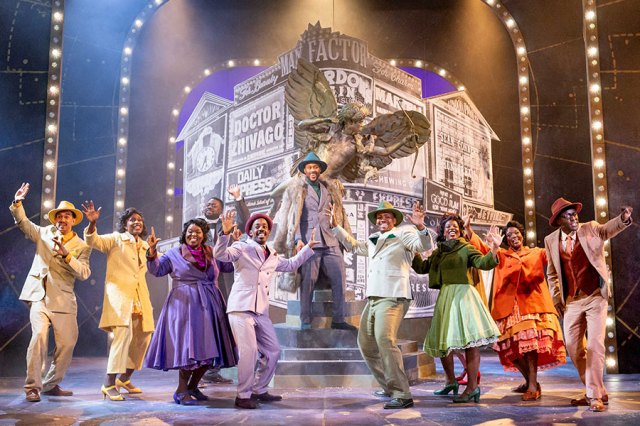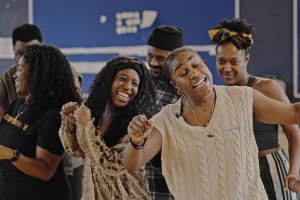
A lot has happened in the 20 years since The Big Life premiered at Stratford East, where it now returns for an anniversary season. The most relevant in terms of this story, inspired by Shakespeare’s Love’s Labour’s Lost, of Caribbean immigrants arriving in the UK in the late 1940s to help rebuild the country following World War Two, is the Windrush scandal perpetrated by the Tory government.
It’s a sad reflection that when this sunny, funny musical opened to popular and critical acclaim in 2004 before transferring into the West End, nobody could have known that many of the lovable, ebullient characters on stage would be exactly the sort of people that, 14 years later, an unfeeling, ungrateful Home Office would wrongly be trying to deport and deny legal rights to. Paul Sirett and Tameka Empson’s revised book addresses that elephant in the room just once, in a heartfelt speech (“we came here not only to work but to show love”) from narrator Mrs Aphrodite (Empson herself, joyfully reprising her original role as a Jamaican pensioner commenting on each scene from a box at the side of the proscenium) that puts an authentic emotional button on what is otherwise mostly a lighthearted show.
In following quite faithfully the Love’s Labour’s Lost plot (a quartet of young men foreswear women for three years, in this case until they re established in the UK), The Big Life doesn’t take much else seriously. Thus the racism that the new arrivals face is only dealt with in a perfunctory fashion, and a prostitute who platonically befriends the men, and at one point appears with a nasty black eye, is depicted as a jolly good time girl, the circumstances that led her to the streets being alluded to but quickly glossed over.
This would matter less if the show was a bit shorter, but it weighs in at a mighty three hours, with 28 songs, and the lack of dramatic substance starts to become more apparent as Tinuke Craig’s production meanders on. Paul Sirett and Paul Joseph’s ska, reggae and calypso inflected score is a great palliative though, and it’s superbly sung, and played by Ian Oakley’s seven piece onstage band.
The fabulous cast wring every last drop of fun out of their roles, and then some. A few performances could be reined in a little, since some nuggets of comedy gold, such as Leanne Henlon and Karl Queenborough’s mutually attracted pairing getting completely legless in a competitive drink-off, get less laughter than they deserve when there is a determination to pull focus elsewhere.
Gabrielle Brooks and Nathanael Campbell are terrific as a fiery young couple temporarily torn apart by a misunderstanding, and Daniel Bailey is gloriously funny as a cheeky charmer who doubles as a giant-winged Eros to help sort out the romantic confusions. Rachel John and Ashley Samuels make something fine and touching out of the most serious of the couples, and contribute stunning vocals, while Juliet Agnes and Khalid Daley delight as arguably the most eccentric of the pairings. Empson’s comic deus ex machina is irresistible (although I wish she had been mic’d more loudly) and almost steals the show despite seldom setting foot on the actual stage.
With its episodic structure, punctuated by hilarious interruptions by the divine Mrs Aphrodite, and despite its vestiges of plot, The Big Life feels less like a conventional book musical than an homage to Stratford East’s legendary variety nights of yore, an impression reinforced by the quartet of lightbulb-studded arches that frame Jasmine Swan’s attractive setting. The costumes are lovely too, each of the four couples dressed in a signature colour. The scenery also includes a pretty boarding house so cramped that it isn’t clear whether it’s too ambitious a set piece for the Theatre Royal’s moderately proportioned stage or if the creatives are making a point about the urban living conditions of that time. Either way, when the whole cast is perched on it, it’s hard not to start feeling claustrophobia by osmosis.
If ultimately The Big Life in this version suggests that you can sometimes have too much of a good thing, it’s heart is undeniably in the right place. There are plenty of moments, usually involving Ingrid Mackinnon’s loose-limbed choreography, Joseph’s lilting tunes and the wall-shaking voices of the cast, when it truly soars. It may be in need of some judicious editing, but it’s still a rollicking crowd pleaser.















